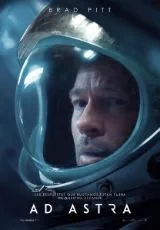Once Upon a Time in Hollywo...
The 2019 hit directed by Quentin Tarantino st...
By Zora Flatley1440

0

Ad Astra is seemingly the story of astronaut Roy McBride’s adventure to the edges of the solar system in an attempt to save Earth from mysterious energy surges. However, confusingly enough, the film isn’t actually about saving humanity or exploring the universe as the title may suggest.
Despite its setting, initial premise, title, and introductory and central events, Ad Astra is actually about the struggles of isolation, the importance of social connection, and a son making peace with his father’s abandonment. Directed by James Gray and starring Brad Pitt, Ad Astra was a thoroughly confusing and somewhat annoying film when I first saw it, but thought provoking and stimulating upon follow-up viewings.
Sometime in the late 21st century, Earth is struck by a series of mysterious cosmic rays. The rays cause immense damage to humans and, in response, the U.S. military’s space division (SpaceCom) traces the energy surges to the planet Neptune, on the site of a scientific mission named Lima, sent out some 29 years ago in search of alien life.
The Lima Project’s equipment, powered by the same energy systems that formed the power surges, is assumed to be the source of the trouble. Astronaut Roy McBride, whose father Clifford McBride led the Lima Project and assumed dead after contact with him is lost, is called in and ordered to travel to Mars where a secure line would be set up to send a message to the Lima Project.
The message would ask Clifford, who Roy was then told may in fact be alive, to end the energy surges with the possibility of a rescue vessel bringing him back to Earth.
It takes Roy a variety of standard, space-fiction-style adventures to first get to Mars, and then later hijack a spaceship to take all the way out to Neptune, where he confronts his father and destroys the Lima Project.
The first half of the film seemed like a generic space adventure film; Roy encounters space pirates on the Moon, which he fights off using a futuristic energy gun; and on his way to Mars, he and the crew escorting him respond to a distress signal coming from a Norwegian biomedical research station, where an enraged baboon has ravaged the station and killed everyone on boardBut, naturally, Roy escapes all of these situations safely...
Roy McBride is on a grand adventure through the black reaches of space to reach his goal, Neptune, where he would find his father, have his closure, and save the Earth.
At least, that’s what the film seems to project to its audience.

To be fair, Ad Astra tries to make its actual plot clear from the beginning. Roy regularly undertakes computerized psychological evaluations which approve him for space travel and mission-readiness.
He expresses uncertainty and anxiety about his feelings towards his father for leaving him and his mother to embark on the Lima Project, as well as struggling with the burden of being the son of one of the greatest pioneers in modern space history He also appears to struggle with his past, describing wronging others, and often flashing back to his time with his wife, Eve, with whom he has severe issues.
From the second half of the film onwards, Ad Astra is about the struggles of isolation, and Roy attempting to resolve these issues by finding his father. Brad Pitt, admittedly, performs very well to make us connect to Roy McBride as much as possible, but that’s just about all the film was capable of in terms of an emotional payoff.
When I first watched the movie, and had little to no foreknowledge of how exactly the conflict would resolve, or the direction the film would take, I was dissatisfied with how little the conflict resolution had to do with the Lima Project’s mission, of finding alien life amongst the stars, and I felt cheated out of all the adventuring and buildup the movie had drawn me in on earlier.
Rewatching it, I was slightly more satisfied, viewing everything from the perspective of Roy as a struggling, traumatized son and husband. But, even so, the film failed to pay off properly in the end due to its many intersecting plot threads. Ad Astra feels like someone had a group of good ideas about space and wanted to put them in a movie to compete with films like 2001: A Space Odyssey, Interstellar, and Gravity.
However, despite all those films taking place in space, each film is radically different to the other, each tackling its own aspect of the human spirit. Ad Astra spends too much time hovering over issues of state and humanity’s failure to progress as a space-faring civilization, and then too much time with Roy McBride marching around space slaying rabid baboons and space pirates, and, finally, too much time with Roy ruminating over his isolated past and estranged father, for the movie to feel consistent in the end.
Despite Ad Astra’s stunning visuals, interesting individual sequences, and moving performances by Brad Pitt and Tommy Lee Jones, the end result is a film that feels both rushed and stretched out.
Reshooting a few scenes and cutting about a quarter of an hour of meaningless footafe, as well as having slightly more screen-time invested into Roy McBride’s backstory would have gone a long way into making this a true film about individuals, instead of feeling like the second half of a character drama set in space for no particular reason besides having it land in store shelves next to Interstellar.
Updated 4 years ago